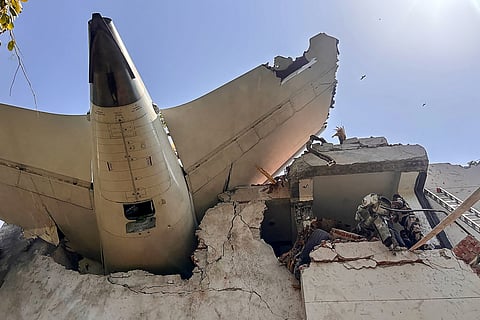Why the Air India flight AI171 cockpit audio deepens mystery of crash
Pilot action will remain core to future investigations, says report

Dubai: The preliminary report from India’s Aircraft Accident Investigation Bureau (AAIB) into the fatal Air India AI171 crash last month has revealed a disconcerting exchange in the cockpit just before the Boeing 787 Dreamliner was to take off from Ahmedabad for London.
The report, released on Saturday by Indian accident investigators, stated that the disaster, which tragically claimed the lives of 260 people on June 12, occurred after the aircraft’s engine fuel cutoff switches were abruptly activated, leading to a complete loss of power.
According to the initial findings, the cockpit voice recorder captured a moment in the flight’s final seconds where one pilot questioned the other about the fuel being cut off.
According to the AAIB report, the other pilot vehemently denied any involvement, responding that he “did not do so.” The Boeing 787 Dreamliner immediately began to lose thrust and altitude, ultimately resulting in the world’s deadliest aviation accident in the past decade.
Aviation analysts have said this conversation between the pilots would be a central focus of the investigation in the future.
Who said what?
Saj Ahmad, Chief Analyst at Strategic Aero Research, commented on the preliminary findings, stating, “With almost 50 hours of flight data extracted from the Enhanced Airborne Flight Recorders (EAFR), there’s a better idea of what led this 787 to crash.”
“What remains unclear, and likely won’t be fully understood until the final report, is the reason behind the movement of the fuel switches, which starved the engines of the necessary power, thrust, and ultimately lift, leading to the tragic crash,” Ahmad added.
The preliminary report notably does not identify which pilot initiated the question about the fuel cutoff or which one denied doing so. Ahmad said that this detail will be the central focus of the ongoing, more extensive investigation. He cautioned against premature speculation at this stage, highlighting the complexity of aviation accident investigations.
GCC operators
Ahmad also highlighted the significance of the preliminary report’s findings for operators of the Boeing 787, particularly those based in the Gulf Cooperation Council (GCC) region.
“For 787 operators, particularly across the GCC, they will be able to continue to operate their fleets as they have done without any major changes. This will undoubtedly provide a sense of confidence to the flying public as well.” He also pointed out the impressive safety record of the 787, stating that it “remains far and away one of the safest widebody jets in service,” with over a billion passengers having been safely transported on these aircraft worldwide.
Final report
This initial conclusion has led to speculation within the aviation community, with some suggesting that if mechanical issues are ruled out, the cause of the crash may lie in human factors. However, the investigation is still in its early stages, and definitive conclusions are yet to be reached.
The investigation is expected to continue for several months, with a final report anticipated to provide a more comprehensive understanding of the events that led to the Air India AI171 crash and offer recommendations to prevent similar incidents in the future. The focus will undoubtedly remain on deciphering the crucial moments in the cockpit and understanding why the fuel cutoff switches were activated.
Sign up for the Daily Briefing
Get the latest news and updates straight to your inbox







